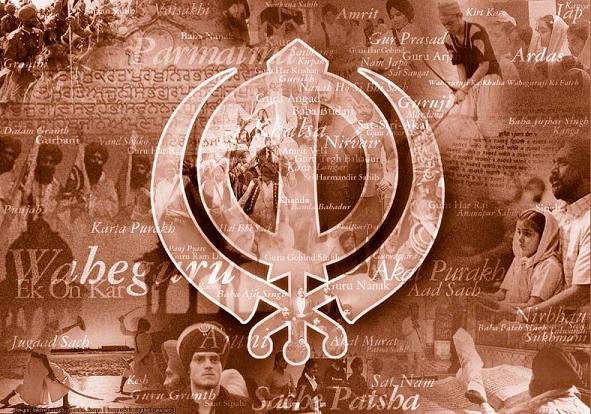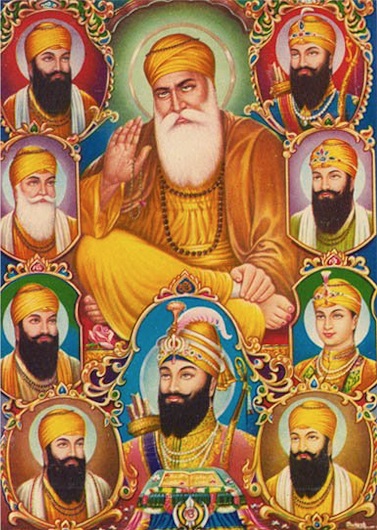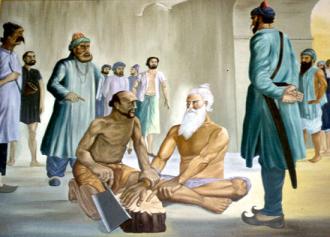Shaheed Bhai Mani Singh
A King can take away the life of a Sikh,
but not his faith or right for worship.
Bhai Mani Singh was a great personality of the 18th century. He is well known for his bravery and scholarship.
Bhai Mani Singh was born in 1644 to Bhai Mai Das. At the age of thirteen, his father took him to Guru Har Rai at Kiratpur from which point on Bhai Mani Singh remained in the service of the Gurus and the Sikh community.
At Anandpur, Bhai Mani Singh transcribed many copies of the sacred Sikh scriptures to send them to different preaching centers in India. He would also teach the reading of gurbani and its philosophy to the Sikhs.
Bhai Mani Singh accompanied Guru Gobind Singh when he went to Paonta, in Himachal, on the banks of the Jamna River. Bhai Mani Singh fought bravely in the Bhangani battle of 1686 to defend Paonta from the joint attack of all the hill rajas. Guru Gobind Singh, after winning the battle returned to Anandpur where the same rajas in 1687 requested him to protect them from the attack of the Army Commander of Kashmir. The Guru agreed to help them. A fierce battle took place at Nadaun in which Bhai Mani Singh took an active role in defeating the invader.
During 1704 Anandpur was surrounded by the combined forces of the hill rajas and those of the emperor of Delhi. When the Guru left the city in December, 1704, Bhai Mani Singh was to escort Mata Sunder Kaur and Mata Sahib Kaur to Delhi. He came with them to Takhat Damdama Sahib Talwandi Sabo, where the Guru settled after defeating the Mughal army in the last battle fought at Mukatsar. At Damdama Sahib, Guru Gobind Singh edited the current version of the Guru Granth Sahib. The honor of transcribing it was given to Bhai Mani Singh.
After the death of Banda Singh Bahadur in 1716, unfortunately, the Sikhs were split into factions, Bandai Sikh and Tat (True) Khalsa. Both sides wanted to take control of Amritsar, and thus there was a great likelihood of a mutual fight among the Sikhs. Fortunately, Bhai Mani Singh was able to tactfully reconcile the two factions.
As in charge of the Golden Temple management, Bhai Mani Singh used to call two general gatherings of the Sikhs there, one at Diwali and the other at Baisakhi. This built the morale of the Khalsa and gave them great strength.
In 1738, Zakaria Khan, Governor of Lahore, gave permission for the Diwali gathering only if the Sikhs paid a tax of Rs. 5000. Bhai Mani Singh hoped to collect the money from the Khalsa when they would come to attend the gathering. But the Governor had a different plan. He sent secret orders to his forces to make a surprise attack on the Sikhs during the night of the Baisakhi function. Bhai Mani Singh came to know of this plan, and sent messages to the Sikhs not to come to Amritsar. The Sikhs who did come, had to leave because of the expected attack by the army. Thus, no money could be collected or paid to the government.


